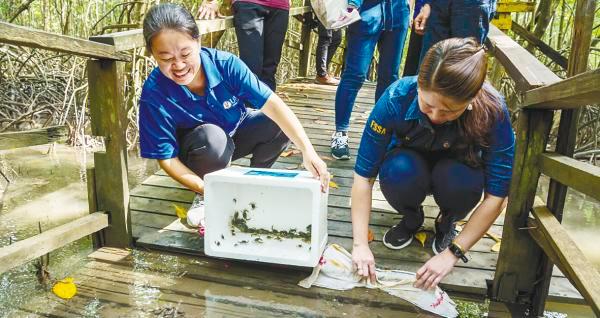KOTA KINABALU: Universiti Malaysia Sabah (UMS) is making efforts to conserve marine ecosystems through a mangrove crab (Scylla Tranquebarica) release programme which is aimed at restoring the mangrove crab population in Sabah waters.
Borneo Marine Research Institute (IPMB) deputy director Dr Mohamad Tamrin Lal said UMS is showing a strong commitment to protecting Malaysia’s coastal biodiversity and encouraging more sustainable use of marine resources through this programme.
He said the mangrove crab release programme, initiated by UMS in 2015, is on the heels of the success of the Hatceri Krustasia IPMB in crab breeding.
“From 2018 to 2022, a total of 45,000 mangrove crab seedlings were released in Tuaran, Kuala Penyu, and Kota Marudu.
“This year, nearly 3,000 seedlings were released at the Kota Kinabalu Wetland (Ramsar Site) in August,” he added.
Mohamad Tamrin highlighted that the activity involves a comprehensive approach that integrates scientific research, community involvement and long-term monitoring.
“Researchers at Hatceri Krustasia IPMB are conducting extensive research to identify suitable locations for the reintroduction of mangrove crabs to their original habitat, taking into consideration factors such as water quality, sediment composition and the availability of food sources,” he said.
Mohamad Tamrin emphasised that community participation and education are vital components of the mangrove crab seedling release programme through UMS’s collaboration with local communities, fishermen and relevant stakeholders.
“UMS believes it can promote a sense of responsibility and collective commitment to protecting coastal habitats for future generations by including the local population in conservation initiatives,” he said.
He pointed out that IPMB and UMS have created long-term monitoring and assessment techniques that make it possible to analyse the programme’s effectiveness and its impact on the local population of mangrove crabs and the conditions of maritime environments.
“With the collaboration of the Kota Kinabalu Wetland (Ramsar Site), UMS will refine strategies to understand the dynamics of mangrove crab populations and the health of mangrove ecosystems in Sabah.
“This programme serves as a model for effective collaboration among academics, non-governmental organisations, and local communities in holistic conservation activities aimed at protecting marine biodiversity,” he said.









